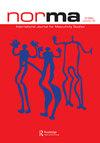流浪、移民和国家建设:对后苏联时期乌兹别克斯坦男性、男子气概和社会变革的批判性审视
IF 1.5
Q2 SOCIOLOGY
引用次数: 1
摘要
乌兹别克斯坦是一个前苏联加盟共和国,在东西方的共同影响下,该国目前正在经历巨大的社会变革。对于乌兹别克男人来说,男子气概的概念和作为一个男人的意义在不断改变。然而,关于乌兹别克斯坦性别和社会变化的理论研究往往集中在女性身上,因此我们对乌兹别克斯坦男性的历史和当代身份、经历和主体性知之甚少。这一范围审查的目的是提供乌兹别克男子气概的概述,并系统地检查乌兹别克男子气概如何在当地和国际上进行研究,以进一步加强我们对后苏联转型的理解。本综述确定了1991年至2020年期间以英语和俄语发表的27篇关于乌兹别克男性气质的研究论文。从广泛的学科中,综述发现,总的来说,研究试图在两个观点之间建立联系:乌兹别克斯坦的男性气概和男性在养家糊口和劳动力迁移方面的责任,以及民族国家在后殖民影响下在塑造性别民族主义方面的作用。文章最后强调了新殖民主义在塑造乌兹别克斯坦研究文化和影响我们对后苏联转型的理解方面的作用的代表性不足。本文章由计算机程序翻译,如有差异,请以英文原文为准。
Breadwinning, migration, and nation-building: a critical scoping review of men, masculinities, and social change in post-Soviet Uzbekistan
ABSTRACT Uzbekistan, a former Soviet republic, is currently experiencing dramatic social changes as a result of both Western and Eastern influences. Notions of masculinity and what it means to be a man continue to change for Uzbek men. However, research theorizing gender and social change in Uzbekistan tends to focus on women, and as a result we know very little about the historical and contemporary identities, experiences, and subjectivities of men in Uzbekistan. The aim of this scoping review is to provide an overview of Uzbek masculinities and systematically examine how Uzbek masculinities have been studied locally and internationally in order to further enhance our understanding of post-Soviet transitions. This review identified 27 research publications in English and Russian between 1991 and 2020 focusing on Uzbek masculinities. Drawing from a wide range of disciplines, the review finds that overall, research has sought to make connections between two ideas: Uzbek masculinities and men's responsibilities in relation to breadwinning and labor migration, and the role of the nation-state in shaping a gendered nationalism as a result of post-colonial influences. The article concludes by highlighting the underrepresentation of neo-coloniality's role in shaping research culture in Uzbekistan and influencing our understanding of post-Soviet transitions.
求助全文
通过发布文献求助,成功后即可免费获取论文全文。
去求助
来源期刊

NORMA
Social Sciences-Gender Studies
CiteScore
3.00
自引率
14.30%
发文量
23
期刊介绍:
NORMA is an international journal for high quality research concerning masculinity in its many forms. This is an interdisciplinary journal concerning questions about the body, about social and textual practices, and about men and masculinities in social structures. We aim to advance theory and methods in this field. We hope to present new themes for critical studies of men and masculinities, and develop new approaches to ''intersections'' with race, sexuality, class and coloniality. We are eager to have conversations about the role of men and boys, and the place of masculinities, in achieving gender equality and social equality. The journal was begun in the Nordic region; we now strongly invite scholarly work from all parts of the world, as well as research about transnational relations and spaces. All submitted manuscripts are subject to initial appraisal by the Editors, and, if found suitable for further consideration, to peer review by independent, anonymous expert referees. All peer review is double blind and submission is online via Editorial Manager.
 求助内容:
求助内容: 应助结果提醒方式:
应助结果提醒方式:


